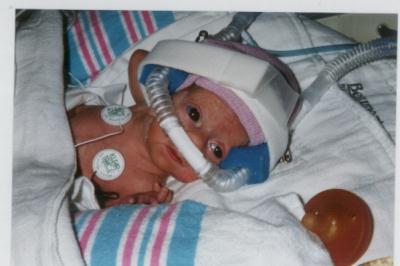
The week of Monday, September 5th, 1994, Tommy's doctors had pretty much decided to let him coast for a little while before trying anything new. Tommy evidently had a different view of what was to come next. Much to the dismay of the staff, on Thursday, September 9, 1994, he extubated himself from the respirator.
Rather than re-intubate a little fighter who obviously knew what was best, he was put on a less aggressive nasal CPAP. CPAP (pronounced "C"-pap) stands for continuous positive airway pressure. Unlike a respirator, the CPAP doesn't actually mechanically breath for the baby. The CPAP provides continuous air pressure that makes it easier for a baby to inflate their lungs when they inhale. It is both less aggressive and less invasive than the respirator.
The CPAP isn't the most comfortable looking thing. Babies on CPAP look as though they are all hooked up to go scuba diving! However, it was a step in the right direction.
On that Sunday, September 11 after a successful few days on the CPAP, he was once again put under an oxygen hood. He handled the oxygen hood much better this time and stayed off more aggressive support for a long while.
Shortly after he was put under the oxygen hood, his mother and I came for that day's visit. His primary nurse was on duty that day and asked us if we wanted to hold him. We had been allowed to hold him from time to time, but always for very short periods of time with the staff attending to the invasive respiratory equipment he required. On that day we were both able to hold him with only a hose blowing supplemental oxygen across his face. It was wonderful.
That evening, after we had left for the day, Thomas was moved from his warming table to an isolette incubator. Extremely premature babies requiring constant care are kept openly exposed on a warming table. This provides easy access to the staff in case a situation arises. More mature preemies requiring less constant attention benefit from the isolation and relative quietness available inside the isolette. The isolette also shields babies from airborne germs and such present in the hospital.
NICU's are noisy places. Each baby is connected to a pulse oximeter and a respiratory and heart rate monitor. These monitors go off frequently and are constantly monitored by the staff. A beeping monitor was usually nothing to panic about. It usually signified a false alarm, a warning that something needed to be adjusted, or a warning that the baby needed some brief attention. I guess that's why they call them neonatal "intensive" care units.
2017 Note -- Thomas' dad now uses an adult version of a CPAP to help with sleep apnea -- so I guess we came full circle!